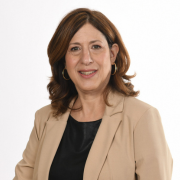Full Professor, Head of the Stanley Steyer School of Health Professions, Gray Faculty of Medical and Health Sciences

Full Professor, Head of the Stanley Steyer School of Health Professions, Gray Faculty of Medical and Health Sciences
Nursing Genetics and Information Technologies
Our research focuses on two main fields:
In genetics our interest is in factors influencing individual decision-making on taking genetic tests. The decision whether or not to take a test may be influenced by factors relating to the illness tested for such as its severity or how far it can be controlled, or by personality factors such as risk perception and optimism, or by the identity of the agent recommending the test (doctor or nurse) and their perceived epistemic authority. In a series of studies we are currently conducting we are trying to find linkages between these factors and the decision whether or not to take genetic tests.
Another issue being studied is the question “to whom does genetic information belong?” Genetic information is of importance to the tested individual’s family as well as to them self. However, not all test subjects share the findings with their relatives. In a large-scale study, conducted together with Dr. Roy Gilbar of the Leicester University and funded by the Israel Cancer Association we examined the attitudes, opinions and behavioral intentions of genetic counselees regarding the disclosure of their genetic information to their families. We are planning a qualitative study to examine views of genetic counselors on this topic.
Information Technologies: Due to the rise of internet technology, medical information is no longer the exclusive property of medical service givers – it is now accessible to everybody― and this new situation has an effect on patient-caregiver relations. Among the research studies we are carrying out, we have investigated the attitudes of nurses towards patients who come forward with information found on the web, what affects those attitudes, and the reactions of nursing teachers to students who bring such information to class. Up to now, most research into this issue has concentrated on the professional caregiver’s point of view. We wish to turn the spotlight onto the patient’s point of view, and on how they feel after bringing Internet information to an appointment with their doctor or nurse.
Elkind, E., Vaisid, T., Kornspan, J. D., Barnoy, S., Rottem, S. & Kosower, N. S. (2011). Neuroprotective effects of Mycoplasma hyorhinis against amyloid-bpeptide toxicity in SH-SY5Y human neuroblastoma cells are mediated by calpastatin upregulation in the mycoplasma-infected cells. Neurochemistry International, 58, 497-503.
Barnoy, S., Levy, O. & Bar-Tal, Y. (2011). What makes patients perceive their health care worker as an epistemic authority? Nursing Inquiry, 19, 128-133.
Barnoy, S., Pruss, D., Ehrenfeld, M. and Kushnir. T. (2011). Epistemic authority and nurses’ reactions to medical information retrieved from internet sites of different sites of different credibility. Nursing and Health Sciences, 13, 366-370.
Itzhaki, M., Bar-Tal, Y. & Barnoy, S. (2013). Staff and lay people’s reactions to family presence during resuscitation: The effect of blood, resuscitation outcome and gender – a quasi-experimental study. Journal of Advanced Nursing, In press.
Itzhaki, M., Bluvstein, I., Raz, S. and Barnoy, S. (2013). Factors affecting the actions and emotional reactions of nursing teachers following encounters with students who present them with Internet Information. Nursing Education Today, 33, 8842–846.
Elkind, E Vaisid, T., Kornspan, J. D., Barnoy, S., Rottem, S. & Kosower, N.S. (2012). Calpastatin upregulation in Mycoplasma hyorhinis-infected cells is promoted by the mycoplasma lipoproteins via the NF-kB pathway. Cellular Microbiology, 14:840-851.
Gilbar, R. & Barnoy, S. Disclosure of genetic information to relatives in Israel: between privacy and solidarity. (2012). New Genetics and Society, 31:391-407.
Skirton, H., Barnoy, S. Erdem, Y., Ingvoldstad, C., Pestoff, R., Teksen, F. & Williams, J. (2012). Suggested components of the curriculum for nurses and midwives to enable them to develop essential knowledge and skills in genetics. Journal of Genetic Counseling, 3:323-9.
Prows, C. A., Hopkin, R. J., Barnoy, S. & Van Riper, M. (2013). An update of childhood genetic disorders. Journal of Nursing Scholarship, 45, 34-42.
Tabak, N., Itzhaki, M., Sharon, D. and Barnoy, S. (2013). Intentions of nurses and nursing students to tell the whole truth to patient and family members. Journal of Clinical Nursing, 22, 1434-1441.
Menshadi, N., Bar-Tal, Y. and Barnoy, S. (2013). The relationship between learned resourcefulness and cancer related fatigue in patients suffering from Non-Hodgkin’s Lymphoma. Oncology Nursing Forum, 40, 133-138.
Kagan, I. and Barnoy, S. (2013). Organizational culture safety and medical error reporting by Israeli nurses. Journal of Nursing Scholarship, 45, 273-280.
Gilbar R, Shalev S, Spiegel R, Pras E, Berkenstadt M, Sagi M, Ben-Yehuda A, Mor P, Perry S, Zaccai TF, Borochowitz Z, Barnoy S. (2016) Patients’ attitudes towards disclosure of genetic test results to family members: the impact of patients’ sociodemographic background and counseling experience. J Genet Couns. 25, 314-324.
Itzhaki, M., Hildesheimer, G., Barnoy, S. & Katz, M. (2016) Family involvement in medical decision making: Perceptions of nursing and psychology students. Nurse Education Today, 40, 181-187.
Peles-Bortz, A., Bluvstein, I., Bergman, L. & Barnoy, S. (2016). Suspicion of gynecologic malignancy: Support resources for women before gynecological surgery. Women & Health, In press.
Itzhaki, M., Meridian, O., Schifter-Sagiv, T. & Barnoy, S. (2016). Nursing students’ attitudes and intention to work with mentally ill patients before and after a planned intervention. Academic Psychiatry, In press.
Bar-Tal, Y. and Barnoy, S. Factors Influencing Participants’ Decision to Comply with Nurse Recommendations. Nursing Inquiry. In press.
Warshawski, S., Barnoy, S. & Itzhaki, M. Factors associated with nursing students’ resilience: communication skills course, use of social media and satisfaction with clinical placement. Journal of Professional Nursing, In press.